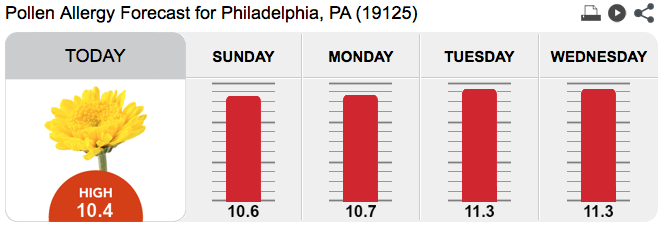
May 09, 2015
You may already be feeling the impact of the "pollen tsunami," which is igniting people's allergies across the region.
The term was dubbed by U.S. allergist Dr. Clifford Basset. The "pollen tsunami" is caused by the late start of spring in the northeast part of the country, as pollen production in plants happened all at once instead of through the normally stage-by-stage process, according to The Weather Network.
Lawns and driveways throughout the region are streaked with yellow, as male trees and plants bloomed seemingly overnight.
As a result, pollen levels figure to be extremely high for Philadelphia over the course of the next few days, according to Pollen.com. Very high:
"It's a simple chain reaction. More heat, more CO2 (carbon dioxide) means faster growing plants, growing in climates they couldn't survive in at one time."
While attempting to fix the ills of climate change is a very ambitious goal, there's plenty you can do in the short term to help address your spring allergies. That includes a few natural remedies, including acupuncture and honey.
To learn more about the science behind allergies, check out this PhillyVoice article from March. After all, if you're going to suffer, you might as well know why.
